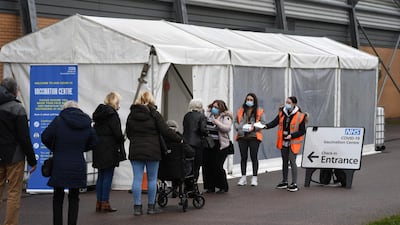The uptake of the Covid-19 vaccine in the UK has exceeded expectations with more than 90 per cent of eligible adults choosing to take it, Health Secretary Matt Hancock said on Thursday.
The British government had assumed that only 75 per cent of adults would accept the vaccine when offered.
More than 13 million people have received their first dose of the vaccine, with about 520,000 people receiving a second dose, according to government data.
The UK approved three coronavirus vaccines, manufactured by Pfizer/BioNTech, AstraZeneca/Oxford University and Moderna.
Only the Pifzer and AstraZeneca shots are being distributed, with the Moderna vaccine expected to to arrive in the spring.
Mr Hancock said uptake was highest among patients aged 75 to 79, with 96 per cent accepting an invitation to be vaccinated.
"We do know that the uptake is far higher than expected, far higher than even my top expectations," he told BBC Radio 4's Today programme.
The UK has administered 20 vaccine doses per 100,000 people, while the UAE has given 47 doses per 100,000, according to Oxford University data.
UK ministers are “very concerned” about low uptake of the vaccine among minority groups.
Sir Jeremy Farrar, director of the Wellcome Trust research fund, said that uptake of vaccines needed to stay high to protect against future variants of the pathogen.
“The risk is that they evade and escape the treatments and vaccines we have available today,” he said.
“If we drive down transmission and vaccinate as many people as we can in this country, and critically around the world, we will reduce the number of viruses we have in the world and the number of variants that can trouble us in the future will be much less.”
The warning came as UK ministers faced pressure to end lockdowns in time for summer holidays.
In Germany, Chancellor Angela Merkel said on Thursday restrictions that were extended until March 7 will not be maintained a day longer than necessary.
She said she understood people's loneliness and frustration at having their freedoms curtailed, but that restrictions were still needed because of the risk posed by new virus variants.
With the emergence of new variants, the World Health Organisation said the focus needed to be on reducing the transmission of the virus to slow the effect of current and future mutations.
“Is it a given that one variant will outcompete the others? Maybe, over time,” said Dr Catherine Smallwood of WHO Europe.
“We don’t know which of the variants that are currently spreading in the European region and in the wider world will be more competitive, but our strategy needs to be blind to the variants themselves and focus on suppressing the virus and all those variants.”
UK Prime Minister Boris Johnson is expected to announce his road map out of lockdown on February 22.
“There is uncertainty and we cannot make categorical assurances, but we’re doing everything we can to get things back to normal,” Mr Hancock said.


